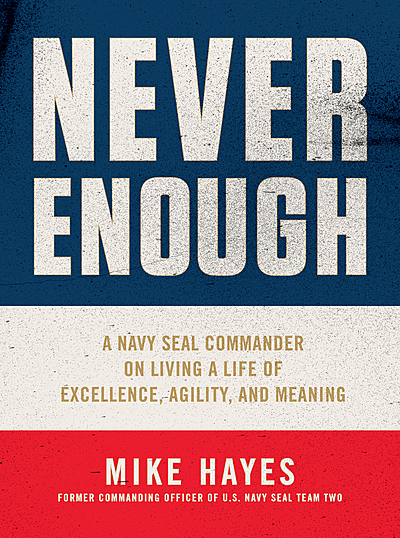We often hear “intrusive” as a negative word, and maybe some- times it is. We don’t want to overstep people’s boundaries, make them uncomfortable, or push past the point of politeness in our interactions. But I think we need to reframe intrusion as something critically necessary to having meaningful relationships. We have to be willing to intrude, to ask the hard questions and have the hard conversations—or we’re not really making a difference. It’s natural to stick to your agenda, especially in a professional setting. Someone might be struggling, but as long as they’re doing the work, you tell yourself it’s none of your business. But it is our business if we might be able to help. Small talk is easy, but getting someone to be vulnerable, emotional, and honest can be hard. And yet without those deeper conversations, we can never really get to know each other.
As a leader in the SEALs, I wanted to be the kind of person others knew they could turn to when things got tough. In life, I strive to be that kind of person for everyone I know. None of what we do—no matter how excellent or agile we train ourselves to become—really matters if we lack the meaning that comes from our bonds and relationships.
In the business world, one of the biggest disappointments I see is the way that networking is often seen as a transactional relationship—what can I get from someone else? Real networking comes from investing energy in other people, giving more than taking, without thinking about whether you’ll ever get paid back. I’ve found that amazing results can emerge from genuinely giving to others and serving them however you can.
First, you feel great about it. Second, the people you help now will inevitably end up helping you later, in ways you can’t plan for or predict. You can’t put in the time with an eye toward your ultimate rewards, but trust me, those rewards will come, especially in your own times of need. The people you invest in without an expectation of investment in return will be the first people who help you whenever it is they can. They are the ones who will say yes to a favor before you even finish asking for one. They are the ones who will praise you to the world and bring unexpected opportunities your way.
There is no shortcut. When I worked in the White House, the days were exceedingly long. There was always so much more work to do. But I made it a point three times a week to have lunch with someone new—to get to know them, and to listen to their stories and goals. I went into every lunch knowing that I would learn something, and figuring that there might be a way to do something great together, provide a useful connection, or see a way to offer them help now or in the future.
There is nothing unique about what I did. Anyone can do it—you find the intersection of your needs and theirs, and see if you can work together to bring something great into the world. As a result of those lunchtime conversations, I would learn a few things about the person. First, I would start to understand what they cared about, the highest-impact items on his or her agenda. Second, I would realize what we had in common, the interests and values we shared, the ideas that could bring us together. Third, I would often end up discovering unexpected connections and hidden opportunities.
The way you get to that third point is often through what I think of as expanding the surface area of a discussion, taking it to subjects that might otherwise go unexplored. You often don’t know someone’s hidden passions or feelings until you happen to stumble upon them. You never know when you might land on a topic that could spark excitement for both of you.
Usually, on the way to those lunches, I’d be thinking about the hundred things I should have been doing at my desk instead. On the way back, all I’d be thinking about was the person I’d just met and the human connection we’d made. At the end of my day, I could never have told you what that extra hour of work would have accomplished, but I could always point to the incredible value of getting to know people in parts of the organization I would not have normally seen. It made me a far more effective leader, with relationships throughout the government—relationships that paid off when I needed to quickly get something onto someone’s desk or to reach out for an internal favor.
The fact that these connections helped make me better at my job was a wonderful bonus, but the underlying motivation was relationship building and the intent to give more than I was ever going to receive.
You will find more incredible advice, insights, stories, and inspiration in Never Enough: A Navy
SEAL Commander on living a life of Excellence, Agility, and Meaning.









